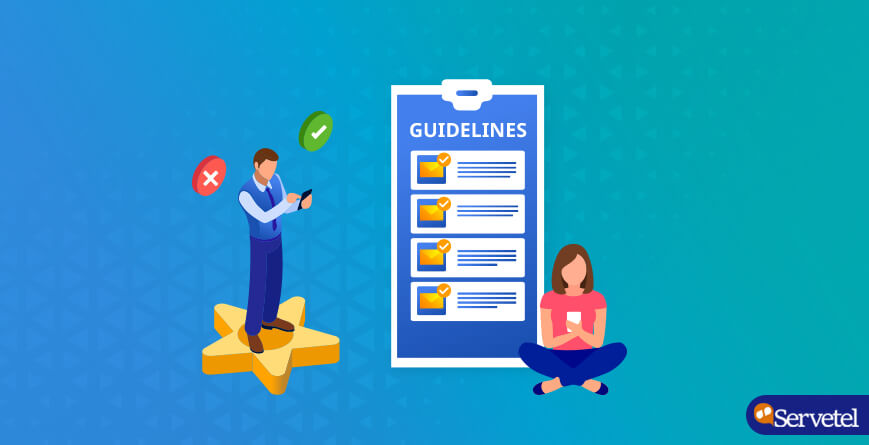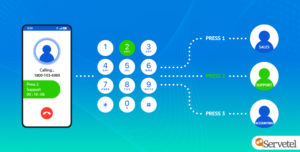The Telecom Regulatory Authority of India (TRAI) has formulated certain restrictions and regulations for broadcasting and bulk SMS services. The authority’s mission is to create the growth of telecommunications industry such that India leads the role in the emerging global information society. A business or telemarketer intending to send either transactional or promotional messages to its customers must first register with the Telecom Regulatory Authority of India and obtain a registration number. The business should comply with the guidelines provided by TRAI.
TRAI has established guidelines and regulations on the following fields of SMS:
- Transactional SMS
- Promotional SMS
- DND Scrubbing
- Sending time
- Termination charges
- Sender’s name
- Penalty fees and so on
1. Transactional SMS
A Transactional SMS is a business SMS which is used by an organization to send any informational messages like order alerts, one-time password, booking and payment information, and so on. They send SMS to the customers in order to pass on information that is necessary for buying the product or service. However, a transactional SMS is not intended for business marketing, unlike a promotional SMS. A business should thoughtfully choose between promotional and transactional SMS. A Transactional SMS service comes with standard business templates, which can also be modified by the firm. For instance, if you are holding a product-based firm and a customer has purchased your product online, a transactional SMS will be sent to the customer saying ‘Your order no.123456 has been shipped and will be delivered to you by dd/mm/yy. Thank you for shopping with us.’
2. Promotional SMS
A promotional SMS is used to send offers, discounts and promotions as the name suggest to existing and new customers as well. However, the messages may or may not be solicited by the recipients. Promotional messages can be set within a fixed time interval (9 a.m. to 9 p.m.) and cannot be sent to customers who have availed the Do Not Disturb (DND) status. The sender ID of a promotional SMS is usually comprised of a random 6-character Sender ID allocated by the telecom operator.
3. DND Scrubbing
Do Not Disturb (DND) is a service initiated by the TRAI for customers or generally the public who do not wish to receive unwanted calls or SMS for promotional purposes. Telemarketers should be careful while sending SMS to their customers and should be cautious in not sending the SMS to DND customers. DND scrubbing is a service provided to help telemarketers differentiate between DND customers and Non-DND customers.
4. Delivery Time
TRAI has also established a set of restrictions on the SMS delivery time. A business can send transactional SMS round the clock anytime anywhere whereas a promotional SMS can be sent only within the standard working hours, i.e. 9 a.m. to 9 p.m. By setting guidelines on the SMS delivery time, the public or the customers are relieved of the unsolicited messages and calls when they come back home from work.
5. Termination charges
Termination charges are fees charged by one telecom operator to other for handling calls. Even in cases free mobile –to –mobile calls provided by certain operator plans; these charges are hidden.
6. Sender’s name
Sender IDs include the name of the brand and it is necessary to register the ID and the message template to be delivered prior to usage. If a message is sent outside of the sender ID and template of the message, it might not get delivered even after causing charges to the sender. The sender IDs vary based on the type of SMS.
The sender ID format of transactional SMS has nine characters from which the business can choose 6 alphabetic characters that denote the name of the brand.
Eg.: 12-ABCDEF
Where
1 is the access provider’s code
2 is the service area code
ABCDEF is the sender name identifier in the message delivered which is representative of the name of the business or organization.
For Promotional SMS, unique sender IDs are available based on the category listed by NCPR such as:
- Banking, Insurance and Finance sector
- Educational institutions
- Healthcare
- Real Estate
- IT, broadcasting, communication and entertainment industry
- Tourism sector
A business can pick an alphanumeric identifier in the format AB-CDDDDD, wherein:
- A is Access provider’s code
- B is a service area code
- C is a numerical from 0 to 7
- DDDDD is the 5-digit identifier allotted by the service provider which is unique
7. Penalty Fees
Non-adherence to the above guidelines will result in incrementing penalties and blacklisting for a period of around 2 years.
8. Other restrictions:
- Supporting Unicode
- Reliability of handset delivery receipts
- Restrictions on sending stock or share related messages through transactional routes. In order to obtain permission to send stock or share related transactional SMS, a business to obtain valid certification from entities registered with SEBI.
- Any social media or website invitations need to be validated and whitelisted prior to sending through transactional accounts. Violating this can result in heavy fines.
Suggested Don’ts
- Sending promotional messages through transactional route
- Calling Do Not Call (DNC)customers for marketing
- Sending promotional messages to DND customers
- Sending promotional messages to customers who have opted-out the feature
- Sending more than six messages to the same recipient within an hour
- Assuming website-based opt-ins as accepted ones
- Sending opt-in messages to customers through transactional routes
Suggested Do’s
- Asking registered users for permission to send any information regarding their offers and services by asking them to accept the opt-in clause
- Providing an opt-out option for customers who have accepted for promotional messages.
- Sending transactional messages to opted-out customers.
- Sending messages transmitted on the directions of the government or any other authorized body.
- Sending SMS of the following types to DNC listed customers:
- Political SMS- It is to be noted that political SMS are prohibited during the election period throughout the entire country
- Charitable SMS
- Informational SMS
- Survey SMS
- Personal SMS
Contact us at 1800-120-4132 to start a hassle-free bulk SMS campaign for your business.

















